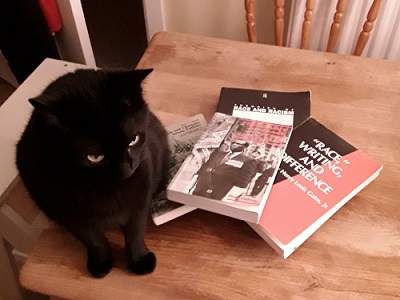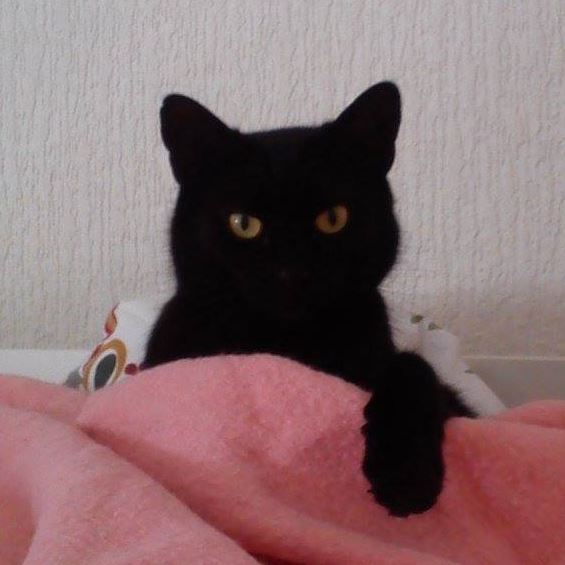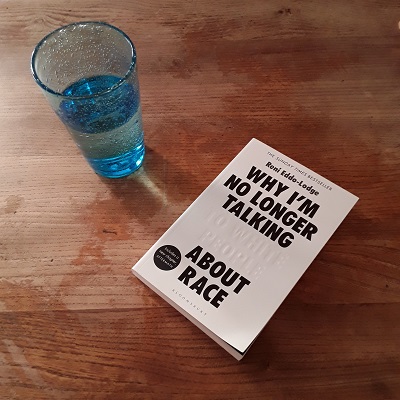Lakhi sits by Paul Gilroy's There Ain't No Black in the Union Jack.

An Equalities and Human Rights Commission survey into racism in the Higher Education sector will close at the end of this month. Meanwhile the BBC published an article in December showing that ethnic minority staff are often put on lower pay grades and struggle against prejudice and bullying. Many did not want to be identified in speaking up about the poor conditions we work in.
I decided I would.
I didn't want to name any institutions. All the many Higher Education institutions I've worked in have been equally poor at rewarding my efforts and recognising my contributions in research, publication, impact in the wider sector and teaching.
At the worst times, when I did think I would be overwhelmed and just swept under without anyone noticing (except my daughter), I doubted myself. I couldn't believe it was true, that I was being discriminated against in such a blatant way; that the structures of the institutions were so integrally white, masculine and middle class that they could not see how their nobly worded policies were being contravened.
For 20 years I've worked on casual and short-term contracts in Russell Group, post-92 and distance learning universities. This is a recognised fate for academics who are women and also for academics from ethnic minority backgrounds. Sometimes people do say to me "perhaps you just weren't good enough for the full-time position." Actually, if you are constantly having to be re-interviewed and prove yourself for your job, you have to be much better at it to stay in it for 20 years.
Very often, I didn't get the job. These were some of the reasons I was given for not being appointed:
- I never thought of you! Why not? Of course, you would have been perfect.
- You can't teach quantitative methods
- But I'm already teaching quantitative methods
- Oh. Well, you can't do research.
- But I'm the only person in Wales doing sociological research on race and ethnicity, and you advertised the job saying you'd give special consideration to any applicants in that field.
- You can't debate the uses of social science.
- (10 years experience teaching postgraduate research methods and writing social policy reports for government.)
- (10 years experience teaching postgraduate research methods and writing social policy reports for government.)
- You can't demonstrate the relationship between power, inequalities and evidence.
It was that last one that provided the break-through. I am the author of an Equalities and Human Rights Commission review of evidence on Education and Inequalities, and I was being interviewed by an expert in film and television studies. Evidently he could not know better than me if I were demonstrating the relationship between power, inequalities and evidence. Some other small thing he said in the interview was actually racist. I was able to finally bring a legal case for discrimination, instead of being brushed off by someone from Human Resources saying (never in writing) "it's very unfair, but unfortunately it's not against the rules."
The Dean of Faculty wrote to assure me that the Faculty treated such cases with great seriousness. They valued the qualifications and experience of staff such as myself. Unfortunately when he did this, he addressed me as Ms. while signing himself Prof. I had to write back and point out that a PhD was part of my application for the job, and a professional qualification in our field of work. After three days he wrote to say: "I note your concern about the use of your title." I knew he had had to go to the lawyers and that I had won.
When I say 'won', I don't mean we were in court and I got proper recompense for losing that job. I mean that we came to a gentleman's agreement that I was sitting on a heap of embarrassing evidence about the way those in power were instituting inequalities and that I would give anyone who tried it on me again a very bloody nose. We both understood that I would be treated scrupulously fairly in the future in job interviews (not favoured - be treated fairly). Sometimes since then I have not got through in interviews, and I believe these were fair decisions; I understood the reason I was being turned down. I worked incredibly hard, putting in long hours to write up evidence and show how power and inequalities were related in my case. It was worth it, although I am still angry I had to waste such a lot of time and effort just to get fair and equal treatment.
In this looking glass world, I did often doubt myself. I could not believe that people who would laugh and joke with me at other times, academics in the social sciences who did research and teaching on equalities, would treat my qualifications and expertise with such contempt in the vital context of a job interview.
There were two kinds of people who made it hard to believe what was happening. Those who discriminated against me, and those who were so lacking in discrimination themselves that they couldn't believe a person like me - whom they respected and loved - could be the target of such irrational and cruel prejudice. They couldn't believe it was happening. They said things like: "Are you sure?" "Maybe he meant …" instead of: "Can I take your daughter for the morning so you can write your case out for the union to look over?"
I survived because the union had my back. The union recognised what was being done to me, supported me and represented my case. United we stand.
I've not had a high-flying career, but I have a job. I enjoy my job, but I don't put my photo up on my profile. I would rather people not take my cat profile picture seriously than not take my real photo seriously.

What is to be done? Higher Education cannot become diverse by sticking different kinds of people into itself, colouring up the profile pictures. It must change from within.
People in Higher Education must listen when women or ethnic minority or disabled or gay staff are concerned about how we are treated, when we say we are made to feel uncomfortable. The knee-jerk response to bring the shutters down and protect reputation must be replaced by genuine open-mindedness and willingness to question: Was it fair? I think I am treating this person as an equal, but perhaps they are actually smarter than me? Too often people in power feel anxious and uncomfortable around ethnic minority staff, and quickly move to thinking the ethnic minority person is a problem rather than the predominantly white working culture.
It would also help if employers immediately started assuming they under-estimate black and minority ethnic staff, and 'artificially' increased their idea of how well we are doing. Then we might get recognised for some of our achievements instead of constantly over-looked. Then they might find they have much better numbers of black and minority ethnic staff in senior roles.
Friends worry about me writing this blogpost, in case I experience backlash of some kind. I fear the opposite: that I will be met by a wall of silence, drowned out by white noise. ("We never think of you.") Even my friends will hesitate over the 'share' and 'like' buttons, made anxious and uncomfortable. Although even if one other person reads this (woman, gay, transgender, disabled, ethnic minority - just different), and realises 'it was true! It wasn't me, it was them,' that will be worth my making the effort to write.
Partly I wrote this blogpost because I wanted to read Why I'm No Longer Talking (To White People) About Race (lent to me by a friend of Cornish/Irish heritage). I wanted to write about my own experience first. I'll make notes about my reading on Instagram and tweet using the hashtag #WINLTTWPAR. It would be a start great if you could check it out and give me some feedback.
- My Insta account: https://www.instagram.com/anlecturer/
- Twitter: @ANLecturer
